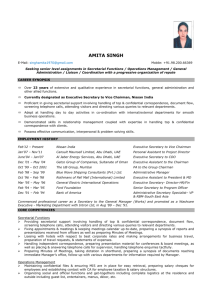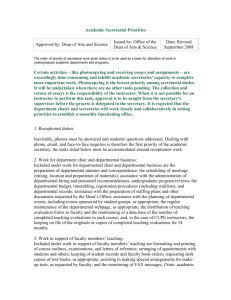JOB DESCRIPTION TEMPLATE
advertisement
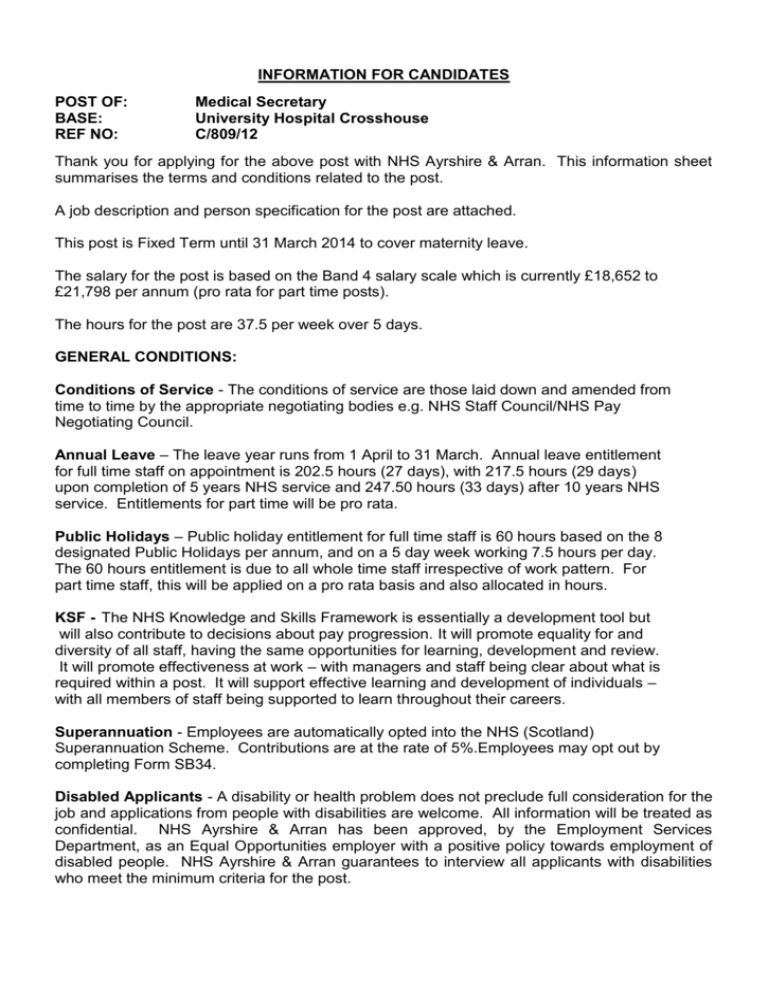
INFORMATION FOR CANDIDATES POST OF: BASE: REF NO: Medical Secretary University Hospital Crosshouse C/809/12 Thank you for applying for the above post with NHS Ayrshire & Arran. This information sheet summarises the terms and conditions related to the post. A job description and person specification for the post are attached. This post is Fixed Term until 31 March 2014 to cover maternity leave. The salary for the post is based on the Band 4 salary scale which is currently £18,652 to £21,798 per annum (pro rata for part time posts). The hours for the post are 37.5 per week over 5 days. GENERAL CONDITIONS: Conditions of Service - The conditions of service are those laid down and amended from time to time by the appropriate negotiating bodies e.g. NHS Staff Council/NHS Pay Negotiating Council. Annual Leave – The leave year runs from 1 April to 31 March. Annual leave entitlement for full time staff on appointment is 202.5 hours (27 days), with 217.5 hours (29 days) upon completion of 5 years NHS service and 247.50 hours (33 days) after 10 years NHS service. Entitlements for part time will be pro rata. Public Holidays – Public holiday entitlement for full time staff is 60 hours based on the 8 designated Public Holidays per annum, and on a 5 day week working 7.5 hours per day. The 60 hours entitlement is due to all whole time staff irrespective of work pattern. For part time staff, this will be applied on a pro rata basis and also allocated in hours. KSF - The NHS Knowledge and Skills Framework is essentially a development tool but will also contribute to decisions about pay progression. It will promote equality for and diversity of all staff, having the same opportunities for learning, development and review. It will promote effectiveness at work – with managers and staff being clear about what is required within a post. It will support effective learning and development of individuals – with all members of staff being supported to learn throughout their careers. Superannuation - Employees are automatically opted into the NHS (Scotland) Superannuation Scheme. Contributions are at the rate of 5%.Employees may opt out by completing Form SB34. Disabled Applicants - A disability or health problem does not preclude full consideration for the job and applications from people with disabilities are welcome. All information will be treated as confidential. NHS Ayrshire & Arran has been approved, by the Employment Services Department, as an Equal Opportunities employer with a positive policy towards employment of disabled people. NHS Ayrshire & Arran guarantees to interview all applicants with disabilities who meet the minimum criteria for the post. You will note on our application form we ask for relevant information with regards to your disability. This is simply to ensure that we can assist you, if you are called for interview, to have every opportunity to present your application in full. We may call you to discuss your needs in more detail if you are selected for interview. Asylum and Immigration Act 1996 and 2004 (Section 8) - The Asylum and Immigration Act 1996 and 2004 requires employment checks to ensure that all employees are legally employed in the United Kingdom. Candidates will be asked to provide relevant original documents prior to an offer of employment being made. Any offer of employment will only be made when the organisation is satisfied that the candidate is the rightful holder of the documents and is legally eligible for employment within the United Kingdom. Medical Examination - Any offer of employment is conditional upon a satisfactory medical report from our Occupational Health Services. You may be offered employment conditional on confirmation that you are medically fit for employment. A commencement date for employment will only be agreed following this confirmation. Policy Relating to Staff with Bloodborne Virus Infection - Candidates for posts which involve exposure prone procedures will not be allowed to commence employment until they have been assessed as fit to perform EPPs by Occupational Health. The preemployment screening must be completed prior to any job offer being made. Where a candidate is not able to perform EPPs, Occupational Health will notify the appropriate manager that the candidate is ‘fit with restrictions’ and is unable to perform EPPs. The health status of the individual will not normally be notified to management. Where the restrictions recommended by Occupational Health are unable to be accommodated due to the clinical duties of any of the posts within the staff groups specified in the policy, an offer of employment to the post will not be made. Candidates who are not offered employment due to being deemed unfit to undertake EPPs as an essential requirement for a post, may be offered the opportunity to apply for another advertised vacant post and be considered with other applicants. The preemployment screening for EPP posts above do not apply to staff undertaking non-EPP posts who could have direct contact with blood, bloodstained body fluids or patients’ tissue in the course of their work activities. These staff will be offered and strongly advised to be immunised against Hepatitis B in line with the Immunisation Policy including recall for boosters and further antibody checks. References - Two satisfactory written references must be obtained prior to any offer of employment being made. These should include current and previous employers as requested in the job application form. This is in line with the Recruitment and Selection Policy. YOUR APPLICATION: Applications - Please note that we no longer acknowledge receipt of applications therefore, unless you are shortlisted to attend for interview, you will not receive any further communication. Informal Enquiries - Informal enquiries welcome to Jackie Lumsden, Medical Secretarial Service Manager who can be contacted on 01563 827062. Closing Date - Your completed application form should be submitted by 15 February 2013 to the address below or can be e-mailed to carol.bell@aaaht.scot.nhs.uk Department of O&HR Development 63A Lister Street Crosshouse Site KILMARNOCK Ayrshire KA2 0BE JOB DESCRIPTION 1. JOB IDENTIFICATION Job Title: MEDICAL SECRETARY Responsible to (insert job title):MEDICAL SECRETARIAL SERVICES MANAGER Department(s): MEDICAL SECRETARIAL Directorate: Operating Division: SURGICAL/MEDICAL UNIVERSITY HOSPITAL CROSSHOUSE, KILMARNOCK Job Reference: C/809/12 No of Job Holders: Last Update (insert date): JANUARY 2013 2. JOB PURPOSE To provide a comprehensive medical secretarial service to Consultants and Clinical Teams. Organise Consultants workload and provide the main point of contact between clinical staff and the service users. 3. DIMENSIONS Working directly to Consultants, SPR’s, SHO’s, clinical and multi-disciplinary teams within their designated department. 4. ORGANISATIONAL POSITION HEALTH CARE MANAGER MANAGEMENT LEAD MEDICAL SECRETARIAL SERVICE MANAGER MEDICAL SECRETARY AUDIO TYPIST 5. ROLE OF DEPARTMENT Provide a medical secretarial service to the clinical or sub specialty team serving the patient population of Ayrshire and Arran through the provision of specialist in-patient, day case and outpatient services. Provide advice to medical and paramedical personnel, patients and other relevant parties on matters pertinent to individual units. To liaise with GP’s, patients, relatives and other relevant parties to ensure up-to-date information on episodes of patient care and future planning of clinical treatment. To liaise with professional staff in other disciplines and community settings to share best practice for care and follow-up of related conditions in individual units. 6. KEY RESULT AREAS Provide and receive routine confidential information, exercising tact and persuasive skills to ensure patients who are worried about test outcomes etc. are reassured and sensitive information is communicated accordingly. Check, interpret, enter and action all relevant clinical information directly from the casesheet onto the clinical audit system, within agreed parameters, for each in-patient and out-patient episode without input from clinical/nursing staff to allow audits to be undertaken to enable the future provision of medical secretarial services in Ayrshire & Arran. Responsible for analysis and planning on an ongoing basis of the computerised waiting list process for patients waiting for operations/respite care, identifying where action may be required to ensure the efficient use of available resources and taking corrective action where appropriate. This will involve assigning appropriate guarantee exemption codes, re-booking patients where another patient has cancelled their appointment, evaluating and taking appropriate action on patients who fail to attend, writing to advise GP, identifying patients who are reaching the waiting list guarantee time and taking appropriate action within agreed parameters, and informing the Medical Secretarial Services Manager / Management Lead of any problems that cannot be resolved. To receive and check all out-patient test results, identifying those which require more urgent attention by a Clinician and take action within agreed parameters (eg: bring forward a clinic appointment in advance of receiving this instruction from Consultant) in order to alleviate any unnecessary anxiety or suffering to the patient. To read/receive referrals from internal and external sources, including prioritising urgent telephone referrals to out-patient clinics and, within agreed parameters, direct patients appropriately, including making out-patient clinic appointments, arranging tests and adding patients to the waiting list, to ensure the smoother running of the service. Provision of accurate and timeous information to GP’s regarding patients’ visit/stay in hospital. This involves the generation of appropriate letter/documentation within locally agreed guarantee times to ensure up-to-date information of patient care at all times. To receive telephone calls from patients/GP’s/relatives requesting information/advice on diverse subjects and, using acquired knowledge, reassure and advise patients/relatives, guide GP’s to appropriate section of the service to ensure accurate flow of information between Hospital, GP and patient. To undertake all administrative duties for Service Director, ie. Consultant Job Plans, arranging meetings and to undertake all administrative duties within the department, ie. provision of medical rotas, intake of six monthly junior staff, tasks associated with medical students, duties associated with the education of junior medical staff, protocols, annual/study leave relating to middle grade/junior medical staff, minutes of various departmental meetings. Maintain consultants’ electronic/paper diary, with a fair degree of independence, to ensure any alterations to service implications are taken into consideration. Ensure that an adequate supply of all stationery stock and administrative forms, i.e : expenses, annual leave, etc., are available to medical staff to ensure that timeous expense claims can be submitted and rotas can be drawn up taking leave into account. Handling cheques, providing receipts to Pharmaceutical Representatives, patients and relatives for all donations/sponsorship received by the Department to ensure financial governance. Operation of a bring forward, pending and filing system, ensuring availability of casenotes and X-rays as appropriate, identification of areas of administrative pressure and delegation/prioritisation of work to shorthand audio typist as appropriate in order to achieve quick retrieval of accurate and up to date information to facilitate the treatment of patients accordingly as well as maintaining an efficient and organised administrative environment. Ongoing analysis of own working practice, suggesting and implementing local change to ensure effective use of secretarial resources, an awareness of health and safety procedures and bringing issues of any concern to the attention of the secretarial supervisor to ensure secretarial service, especially in staff shortage situations, operates efficiently and safely at all times. Undertake specific training within relevant specialty for new starts as well as ongoing training to ensure organisational practices and procedures are developed and implemented and skill levels are maintained. When required, to delegate / re-allocate work as appropriate to ensure the smooth running of the service. 7a. EQUIPMENT AND MACHINERY The main equipment/machinery used in a Medical Secretarial role are: PC / Hard Drive – to store documents, type information onto etc. Printer – to print out all documentation ie letters to be filed in casenotes. Audio transcriber / digital dictation software along with power supply, foot pedal and head set – to transcribe back tapes. Hand held dictation machines Telephone and telephone answer machine Fax Machines Photocopiers Scanners Shredding machine 7b. SYSTEMS The Secretary will up-date and maintain the following systems in relation to patient information: PMS – Patient Hospital System Micromed – audit system where patient admission and discharge details are stored Unisoft – audit system where clinic letters are typed, up-dated and stored. OPERA – theatre booking system SERPR – Renal database SCI dc – National diabetic database eKSF – PDR recording system Learn Pro – training system Winscribe – digital dictation system Manual records – waiting list print out, waiting list cards, waiting list diaries, files recording Consultant and clinical team’s annual leave etc. Manual log of patients with specific conditions (ie: Consultant interests) Out-patient Monitoring System – Secretary will record the number of out-patient clinics sent out within the guarantee time. This information is then given to the Medical Secretarial Service Manager who distributes this widely to Management. 8. ASSIGNMENT AND REVIEW OF WORK Assignment of workload is totally demand led and based on patient activity throughout the specialty. The medical secretary is required to prioritise the workload with total autonomy. The medical secretarial manager through monitoring workload and consultation with the Consultant assesses standard of work. A more formal review is carried out in the form of staff appraisals on a yearly basis. 9. DECISIONS AND JUDGEMENTS Typical judgements will involve: prioritising the order of tapes/jobs to be typed, preparing casenotes and files for the following day, when appropriate - allocation of a guarantee exemption code to waiting list patients, autonomy to take decisions regarding all appointment making within the department, ie. clinic appointments, arrange follow-up to clinical test results. Secretary has autonomy to provide information to patients/GPs/Midwives, etc. 10. MOST CHALLENGING/DIFFICULT PARTS OF THE JOB Prioritise patients for appointments at times when there are conflicting demands (ie: patients identified by consultant as “urgent” versus patients nearing their maximum guaranteed time). Dealing with upset, awkward and verbally abusive patients by telephone and face to face - at all times maintaining a sympathetic and tactful approach. As an Acute Emergency Receiving Hospital, having an in-depth knowledge of the specialty in which you are working to enable you to provide advice/guidance to all service users, often in demanding circumstances. These demands are particularly challenging when a staff member(s) is absent and the remaining staff have to absorb the work/problems without relief cover. Challenge of having to work to the locally agreed guarantee times for all clinic and discharge correspondence as well as maintaining waiting list targets. Using acquired skills and knowledge to identify and solve organisational problems i.e. timetabling and notifying all necessary departments thus ensuring efficient utilisation of resources available to the department. Challenge of having to work to the locally agreed guarantee times for all clinic and discharge correspondence as well as maintaining waiting list targets. Using acquired skills and knowledge to identify and solve organisational problems i.e. timetabling and notifying all necessary departments thus ensuring efficient utilisation of resources available to the department. 11. COMMUNICATIONS AND RELATIONSHIPS Consultants and clinical team, other ward Staff, Patients and Relatives, GPs and Midwives: daily communication face to face, by telephone, e-mail and letter for information sharing, negotiating advising, re-assuring and persuading. Can sometimes involve dealing with emotional and stressful situations. Other hospitals and hospital departments : occasional contact by telephone or letter for information sharing Other Agencies, ie Police/Social Work Department: face to face, telephone and correspondence for diverse reasons. Pharmaceutical sales representatives : frequent contact face to face and by telephone to organise appointments requiring persuasive and organisational skills Educational/Employment Institutions: occasional contact by telephone or letter for information sharing, organising events, references etc. 12. PHYSICAL, MENTAL, EMOTIONAL AND ENVIRONMENTAL DEMANDS OF THE JOB PHYSICAL EFFORT/SKILLS: Combination of sitting, walking and standing. Frequent requirement for sitting in a restricted position/occasional requirement for moderate physical effort. Word-processing and input for a substantial proportion of working time. Frequent use of audio transcriber. Need to carry bulky casenotes or push same in trolley. MENTAL EFFORT/SKILLS: Secretaries require to be mentally alert at all times when handling case records/clinical reports/scan reports etc., to ensure that no errors have been made which would compromise patient care with potential serious consequences, ie: wrong patient’s report in casesheet. The unpredictable nature of the job necessitates the highest level of concentration in all matters ie: arranging urgent referrals, dealing with abnormal reports, dealing with distressed patients’ etc. As a large number of tapes/jobs requiring to be transcribed by the Secretarial staff are dictated by doctors who do not have English as their first language, a high degree of concentration, knowledge of specialty and the ability to punctuate and make sense of what is dictated is essential, without changing the clinical context. Secretary should have excellent organisational and analytical skills. In view of the fact that there are many interruptions to tasks being carried out, the Secretary requires the ability to switch from one problem area to another and back again efficiently. EMOTIONAL/ENVIRONMENTAL EFFORT/SKILLS: As the first point of telephone contact, Secretarial staff are in contact with patients under the influence of drugs, alcohol etc., who may be difficult resulting in verbal abuse, dealing with distressed and sometimes irrational patients and relatives by telephone. Typing letters of a distressing nature or receiving abnormal reports to deal with. Following distressing situations, such as the death of a patient, child, intra-uterine death, the Secretary may be the first point of contact for the relative/parent before transferring through to the Consultant. This can be either on the telephone or face to face. Required to work in a challenging environment where the workload demands arising affect the whole office. 13. KNOWLEDGE, TRAINING AND EXPERIENCE REQUIRED TO DO THE JOB Relevant secretarial qualification, e.g. AMSPAR Diploma for Medical Secretaries, RSA or Scotvec qualification and/or equivalent secretarial experience. Accurate audio-typing skills. Excellent standard of English language. Working knowledge of Microsoft software packages. Ability to develop an acquired knowledge of medical terminology. Demonstrate ability to manage time, prioritise workload and be flexible in approach to working practices. Ability to communicate clearly and sensitively with a wide range of disciplines/general public. Accurate note-taking skills, e.g. shorthand / speedwriting. In-depth knowledge of specialist area in order to enhance organisational and analytical skills in response to service demands. Ability to work in a team environment or on your own initiative. PERSONAL SPECIFICATION C/809/12 FACTOR Qualifications and/or experience - MEDICAL SECRETARY Knowledge & Skills Medical Terminology Comprehensive knowledge of In Patient Waiting lists/National guidelines Accurate audio-typing skills Excellent keyboard skills Proficient in use of Microsoft Office with excellent PC knowledge Excellent communication & Experience of working with interpersonal skills general public Excellent time management & prioritisation skills Highly effective & efficient organisational skills Track record of working successfully within a team Ability to work well on own initiative but to recognise professional boundaries and know when to seek direction Commitment to professional development Attributes Training & Development Other ESSENTIAL DESIRABLE Relevant secretarial Experience of NHS software qualification packages (eg. PMS) (eg. AMSPAR Diploma for Medical Secretaries, RSA, HNC, Business Administration or equivalent qualification(s)) Extensive experience working with In Patient Waiting list Excellent understanding and comprehension of English language Experience of working in a busy office environment

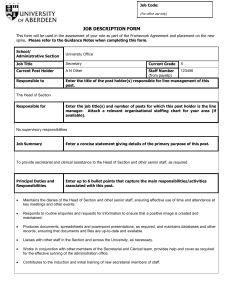
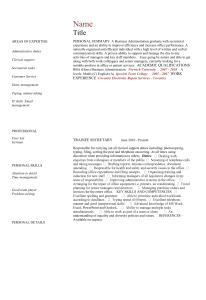
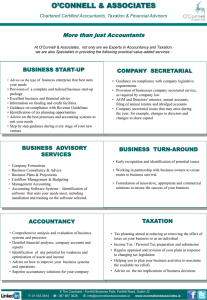

![Academic Support Secretary [Final]](http://s3.studylib.net/store/data/007059557_1-4ecf935e6f5004452a5d37b926c1c552-300x300.png)
